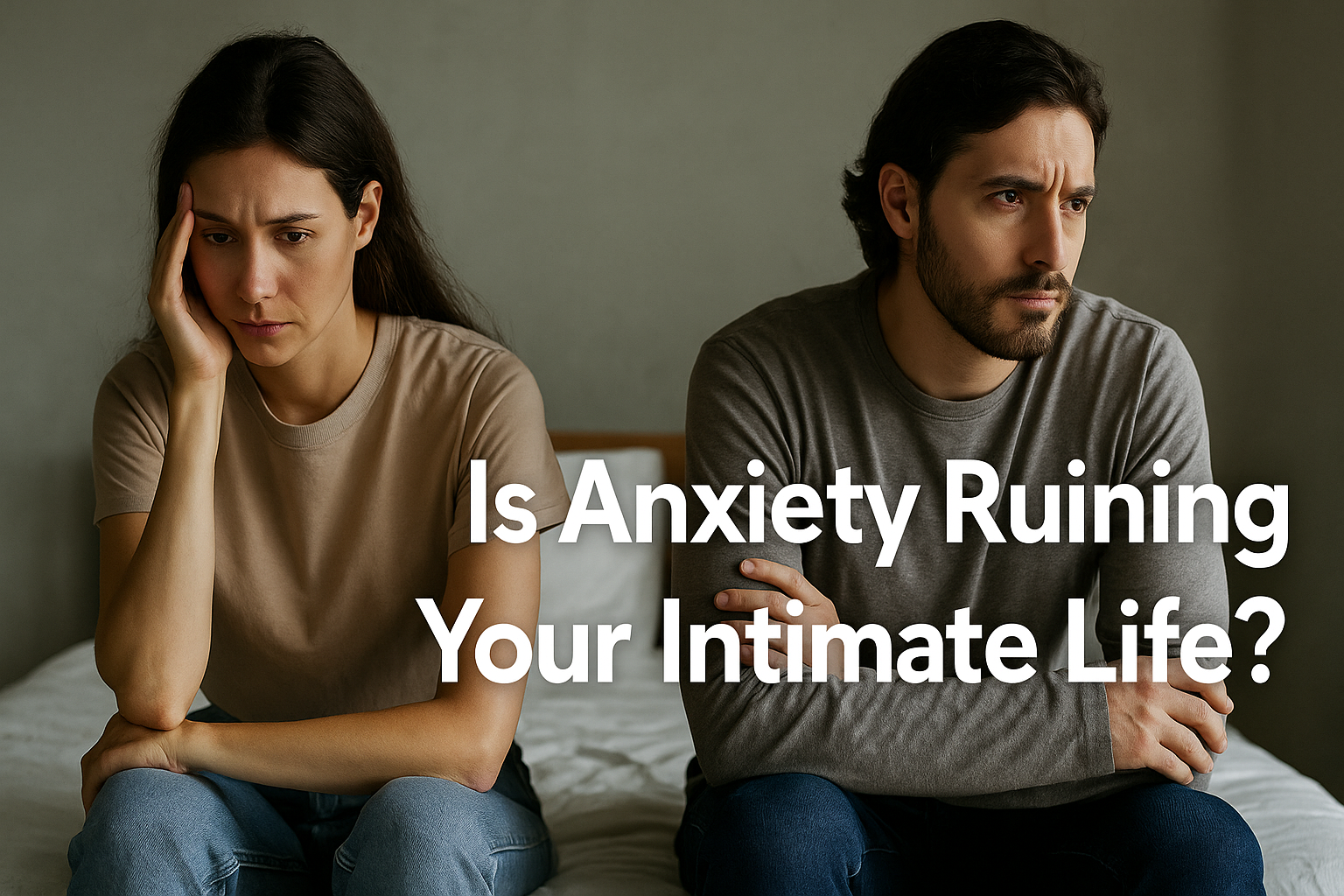
Understanding Anxiety Intimacy Issues

In today’s fast-paced world, emotional health has become a silent disruptor of relationships. Anxiety intimacy issues are real and more common than many adults admit. Emotional tension, stress at work, and inner fears often show up in the bedroom without warning. When anxiety becomes a barrier, intimacy often feels forced or even absent. The warmth that once connected two people may slowly begin to fade.
Most adults don’t immediately recognize that anxiety intimacy issues are at the root of their struggles. They may think they’re just tired or distracted. However, when anxiety takes over the mind, it disrupts the ability to feel safe and emotionally available in intimate settings.
How Anxiety Disrupts Emotional Connection

Some adults have said that when they feel anxious, their minds can’t focus on closeness. Their bodies may be present but their hearts and thoughts feel distant. This emotional gap creates frustration for both partners. Anxiety often triggers overthinking, fear of judgment, and physical discomfort which makes intimacy feel more like pressure than pleasure.
Communication may decline because partners begin to avoid difficult conversations. A person with anxiety may fear rejection or criticism. This fear creates walls, not bridges. Over time, these anxiety intimacy issues may result in feelings of loneliness even when physically together.
Physical Signs That Anxiety Is Hurting Intimacy

Many couples don’t connect the dots between stress and physical intimacy. Here are some subtle signs that anxiety may be playing a role:
- Decreased interest in touch or affection
- Avoiding eye contact during vulnerable moments
- Feeling numb or detached during intimacy
- Trouble expressing emotions in bed
- Panic or racing thoughts before or during sex
Each of these may not seem serious alone. But when combined, they point to deeper anxiety intimacy issues that need care and attention.
Rebuilding Connection Gently and Safely

Instead of blaming each other or shutting down, some adults prefer to explore gentle ways to reconnect. Creating emotional safety comes first. It begins outside the bedroom. Spend quality time that is free from digital distractions. Look into each other’s eyes when speaking. Touch can start with something as simple as holding hands.
Some adults explore mindfulness or grounding techniques. Deep breathing before intimacy helps reduce anxiety and brings focus to the present moment. Soft lighting, calm music, and a stress-free environment may help ease the mind and body.
The Role of Scent in Emotional Comfort
Scent plays a quiet but powerful role in intimacy. Some adults explore natural options like pheromone perfumes to enhance comfort and emotional presence. These fragrances are said to subtly affect mood and attraction without pressure. Though not a solution alone, pheromone perfumes may support a more relaxed and emotionally connected space for adults experiencing anxiety intimacy issues.

Building Trust Through Communication

Partners facing anxiety intimacy issues need to talk—but not during arguments or moments of frustration. Choose calm moments when both feel open. Some adults say writing thoughts in a letter or journal helps them express feelings that feel too hard to say aloud.
Use “I” statements like “I feel anxious when…” instead of blaming. Let your partner know you want to be close but anxiety makes it hard. When both partners understand the problem, they can work on it together.
When Professional Support Is Needed

There’s no shame in seeking help. Many couples and individuals talk with counselors or therapists to understand their emotions better. Some adults discover that past trauma or ongoing stress from work or family contributes to their anxiety intimacy issues. With guidance, they learn healthy ways to reconnect and manage fear.
Cognitive behavioral therapy (CBT) is one method that helps adults identify thought patterns that block emotional and physical closeness. Others prefer talk therapy or relationship coaching.
Daily Habits That Support Emotional Intimacy

Rebuilding intimacy takes time but daily efforts make a difference. Adults dealing with anxiety intimacy issues can explore these supportive habits:
- Go for short walks together without talking about stress
- Practice gratitude toward each other at the end of the day
- Try 10-minute meditation sessions as a couple
- Respect emotional boundaries without creating distance
- Focus on presence rather than performance in the bedroom
These small habits allow space for warmth and safety to grow again. When anxiety feels acknowledged rather than judged, it loses its power.
The Importance of Patience

It’s normal to feel frustrated when connection fades. But remember that anxiety doesn’t mean someone has fallen out of love. It’s a sign the mind is overwhelmed. What’s needed most is patience and reassurance.
Some adults need time to feel their emotions and reconnect slowly. Forcing intimacy may only increase pressure and deepen anxiety intimacy issues. It’s okay to take steps, not leaps.
FAQs About Anxiety and Intimacy
1. Can anxiety completely destroy intimacy?
Not always. It may create distance but intimacy can be rebuilt with understanding and support.
2. What are common causes of anxiety intimacy issues?
Work stress, past trauma, fear of rejection, and mental health conditions are common contributors.
3. Can physical intimacy improve anxiety?
Yes, when emotional safety is present. It can release hormones that ease stress.
4. How do I talk to my partner about anxiety and intimacy?
Choose a calm time. Use “I” statements. Be honest and avoid blame.
5. Are pheromone perfumes helpful for intimacy?
Some adults explore pheromone perfumes to support comfort and attraction but results vary.
6. Is therapy useful for anxiety intimacy issues?
Yes. Therapists can help uncover emotional blocks and teach healthy connection skills.
7. What should I avoid during intimacy when feeling anxious?
Avoid pressure, expectations, and rushing. Go slow and focus on emotional comfort.
8. Does anxiety affect both partners in a relationship?
Yes. Even if one person feels it directly, both partners are impacted emotionally.
9. Can stress-reducing habits improve intimacy?
Definitely. Habits like deep breathing, exercise, and mindful touch can support closeness.
10. How long does it take to fix intimacy problems caused by anxiety?
It varies. Some couples reconnect in weeks while others take months. Patience is key

